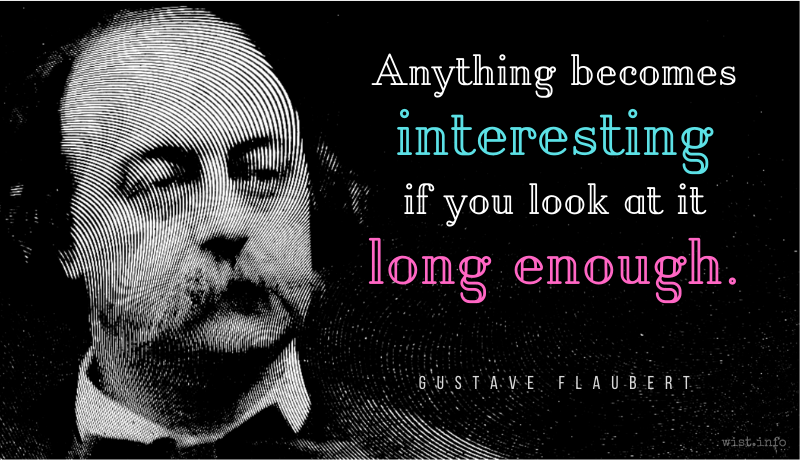Gradually we become tired of the old, of what we safely possess, and we stretch out our hands again. Even the most beautiful scenery is no longer assured of our love after we have lived in it for three months, and some more distant coast attracts our avarice: possessions are generally diminished by possession.
[Wir werden des Alten, sicher Besessenen allmählich überdrüssig und strecken die Hände wieder aus; selbst die schönste Landschaft, in der wir drei Monate leben, ist unserer Liebe nicht mehr gewiss, und irgend eine fernere Küste reizt unsere Habsucht an: der Besitz wird durch das Besitzen zumeist geringer.]Friedrich Nietzsche (1844-1900) German philosopher and poet
The Gay Science [Die fröhliche Wissenschaft], Book 1, § 14 (1882) [tr. Kaufmann (1974)]
(Source)
Also known as La Gaya Scienza, The Joyful Wisdom, or The Joyous Science.
(Source (German)). Alternate translations:We gradually become satiated with the old, the securely possessed, and again stretch out our hands; even the finest landscape in which we live for three months is no longer certain of our love, and any kind of more distant coast excites our covetousness: the possession for the most part becomes smaller through possessing.
[tr. Common (1911)]We slowly grow tired of the old, of what we safely possess, and we stretch our our hands again; even the most beautiful landscape is no longer sure of our love after we have lived in it for three months, and some more distant coast excites our greed: possession usually diminishes the possession.
[tr. Nauckhoff (2001)]We gradually grow weary of the old, familiar things we securely hold, and again stretch forth our hands; even the most beautiful landscape lived in for three months is no longer assured of our love, and some more distant shore excites our avarice: what is had loses much in the having.
[tr. Hill (2018)]
Quotations about:
familiarity
Note not all quotations have been tagged, so Search may find additional quotes on this topic.
The need for a body of common knowledge and common reference does not disappear when a society is largely pluralistic, as ours has become. On the contrary, it grows more necessary, so that people of different origins and occupation may quickly find familiar ground and, as we say, speak a common language. It not only saves time and embarrassment, but it also ensures a kind of mutual confidence and good will. One is not addressing an alien, blank as a stone wall, but a responsive creature whose mind is filled with the same images, memories, and vocabulary as oneself.
Jacques Barzun (1907-2012) French-American historian, educator, polymath
“Of What Use the Classics Today?,” Lecture, St. John’s College (1987-07-17)
(Source)
Collected in Begin Here: The Forgotten Conditions of Teaching and Learning (1991).
False greatness is unsociable and inaccessible; as it is sensible of its weakness, it conceals itself, or at least does not show itself openly, and only allows just so much to be seen as will carry on the deceit, so as not to appear what it really is, namely, undoubtedly mean. True greatness, on the contrary, is free, gentle, familiar, and popular; it allows itself to be touched and handled, loses nothing by being seen closely, and is the more admired the better it is known.
[La fausse grandeur est farouche et inaccessible: comme elle sent son faible, elle se cache, ou du moins ne se montre pas de front, et ne se fait voir qu’autant qu’il faut pour imposer et ne paraître point ce qu’elle est, je veux dire une vraie petitesse. La véritable grandeur est libre, douce, familière, populaire; elle se laisse toucher et manier, elle ne perd rien à être vue de près; plus on la connaît, plus on l’admire.]Jean de La Bruyère (1645-1696) French essayist, moralist
The Characters [Les Caractères], ch. 2 “Of Personal Merit [Du Mérite Personnel],” § 42 (2.42) (1688) [tr. Van Laun (1885)]
(Source)
(Source (French)). Alternate translations:False Greatness is unsociable, inaccessible, as if 'twere sensible of its weakness, and strove to conceal it. 'Twill not be seen, except just so much, as may carry on the Deceit, but dares not shew its Face for fear of being discover'd: Discover'd how really little and mean it is. True Greatness, on the contrary, is free, complaisant, familiar, popular, suffers it self to be touch'd and handl'd, loses nothing by being view'd near at hand, is rather more known and admir'd for it.
[Bullord ed. (1696)]False greatness is unsociable and remote: conscious of its own frailty, it hides, or at least averts its face, and reveals itself only enough to create an illusion and not be recognized as the meanness that it really is. True greatness is free, kind, familiar and popular; it lets itself be touched and handled, it loses nothing by being seen at close quarters; the better one knows it, the more one admires it.
[tr. Stewart (1970)]
Childhood is the world of miracle and wonder; as if creation rose, bathed in light out of the darkness, utterly new and fresh and astonishing. The end of childhood is when things cease to astonish us. When the world seems familiar, when one has got used to existence, one has become adult. The brave new world, the wonderland has grown trite and commonplace.
[L’enfance c’est le monde du miracle ou du merveilleux: c’est comme si la creation surgissait, lumineuse, de la nuit, toute neuve et toute fraîche, et tout étonnante. Il n’y a plus d’enfance à partir du moment où les choses ne sont plus étonnantes. Lorsque le monde vous semble «déja vu», lorsqu’on s’est habitué à l’existence, on devient adulte. Le monde de la féerie, la merveille neuve se fait banalité, cliché.]Eugène Ionesco (1912-1994) Romanian-French dramatist
Fragments of a Journal [Journal en Miettes], “The Crisis of Language” (1967) [tr. Stewart (1968)]
(Source)
If a book read when young is a lover, that same book, reread later on, is a friend. […] This may sound like a demotion, but after all, it is old friends, not lovers, to whom you are most likely to turn when you need comfort. Fatigue, grief, and illness call for familiarity, not innovation.
And now I understand
something so frightening, and wonderful —
how the mind clings to the road it knows, rushing
through crossroads, sticking
like lint to the familiar.
It is the function of art to renew our perception. What we are familiar with we cease to see. The writer shakes up the familiar scene, and as if by magic, we see a new meaning in it.
Anaïs Nin (1903-1977) Catalan-Cuban-French author, diarist
The Novel of the Future, ch. 2 “Abstraction” (1968)
(Source)
And now I understand
something so frightening, and wonderful —
how the mind clings to the road it knows, rushing
through crossroads, sticking
like lint to the familiar.
JUBA: Beauty soon grows familiar to the lover,
Fades in his eye, and palls upon the sense.
What a comfort one familiar face is in a howling wilderness of strangers!
The first impression is readily received. We are so constituted that we believe the most incredible things; and, once they are engraved upon the memory, woe to him who would endeavor to efface them.
[Der erste Eindruck findet uns willig, und der Mensch ist gemacht, daß man ihn das Abenteuerlichste überreden kann; das haftet aber auch gleich so fest, und wehe dem, der es wieder auskratzen und austilgen will!]
Johann Wolfgang von Goethe (1749-1832) German poet, statesman, scientist
The Sorrows of Young Werther, Book 1, “August 15” (1774) [tr. Boylan]
(Source)
Alt. trans.:
- "... woe to him who would endeavor to erase them!" [tr. Lange, Ryan]
- "The first impression finds us receptive, and man is so made that he can be persuaded by the most outlandish things; but it strikes root so immediately that woe to him who tries to scratch it out and eradicate it!" [tr. Pike (2004)]
- Original German.
Familiarity breeds contempt, while rarity wins admiration.
[Parit enim conversatio contemptum; raritas conciliat admirationem.]
Apuleius (AD c. 124 - c. 170) Numidian Roman writer, philosopher, rhetorician [Lucius Apuleius Madaurensis]
On the God of Socrates [De Deo Socratis]
(Source)
First recorded passage with this phrase. Discussing why the gods do not mingle with humanity. Alternate translations:The first part of the phrase is also used as the modern moral the English translation of Aesop's "The Fox and the Lion." Applying this proverb to Aesop seems to have first happened in 1820; in classic Greek sources, the moral was more along the line that "acquaintance overcomes fear."
- "Familiarity produces contempt, but infrequency conciliates admiration."
[tr. Taylor (1822)]- "Familiarity breeds contempt, but privacy gains admiration." [
Works of Apuleius (1853)]- "Familiarity breeds contempt, but concealment excites interest."
[National Review (1858-04)]
Anything becomes interesting if you look at it long enough.
[Pour qu’une chose soit intéressante, il suffit de la regarder longtemps.]
Gustave Flaubert (1821-1880) French writer, novelist
Letter to Alfred Le Poittevin (16 Sep 1845)
(Source)
Alt. trans.: "To make something interesting, just look at it for a long time."
ENOBARBUS: Age cannot wither her, nor custom stale
Her infinite variety; other women cloy
The appetites they feed, but she makes hungry
Where most she satisfies.William Shakespeare (1564-1616) English dramatist and poet
Antony and Cleopatra, Act 2, sc. 2, l. 276ff (2.2.276-279) (1607)
(Source)
Ever since I had dinner with Lou Reed I’ve tried to avoid meeting the people who would make me feel starstruck. It was a great dinner but by the end of it Lou Reed was no longer my hero, and I don’t have many heroes. I resolutely avoided meeting David Bowie, which became harder when I became friends with Duncan Jones, his son, and then got even harder when I moved to Woodstock and he lived around the corner. But I love the fact that the Bowie that I have is the Bowie in my head: a strange, evolving, absolutely fictional Bowie who became my hero when I was 11.
Neil Gaiman (b. 1960) British author, screenwriter, fabulist
“This Much I Know,” The Guardian (2017-08-05)
(Source)
Sit at the feet of the masters long enough, and they’ll start to smell.
(Other Authors and Sources)
Sauget’s Law of Education
(Source)
Attributed to John Sauget of Urbana, Ill., in Paul Dickson, The Official Rules, "Revised Proverbs" (1978).
The choicest garb, the sweetest grace,
Are oft to strangers shown;
The careless mien, the frowning face,
Are given to our own.
We flatter those we scarcely know,
We please the fleeting guest,
And deal full many a thoughtless blow
To those who love us best.Ella Wheeler Wilcox (1850-1919) American author and poet.
“Life’s Scars,” st. 3 (1896)
(Source)
Originally published in Frank Leslie's Popular Monthly, Vol. 42, #4 (1896-10)
No man is a hero to his valet.
Anne-Marie Bigot de Cornuel (1605-1694) French wit and aphorist
Lettres de Mlle Aïssé, 12.13 (1728)
See Goethe.
“Familiarity breeds kontempt.” This only applies tew men, not tew hot bukwheat slapkakes, well buttered and sugared.
[“Familiarity breeds contempt.” This only applies to men, not to hot buckwheat slapcakes, well buttered and sugared.]
Josh Billings (1818-1885) American humorist, aphorist [pseud. of Henry Wheeler Shaw]
Josh Billings: His Works, Complete (1873)
See Apuleius.
HAL: If all the year were playing holidays,
To sport would be as tedious as to work,
But when they seldom come, they wished-for come,
And nothing pleaseth but rare accidents.William Shakespeare (1564-1616) English dramatist and poet
Henry IV, Part 1, Act 1, sc. 2, l. 211ff (1.2.211-212) (1597)
(Source)
























